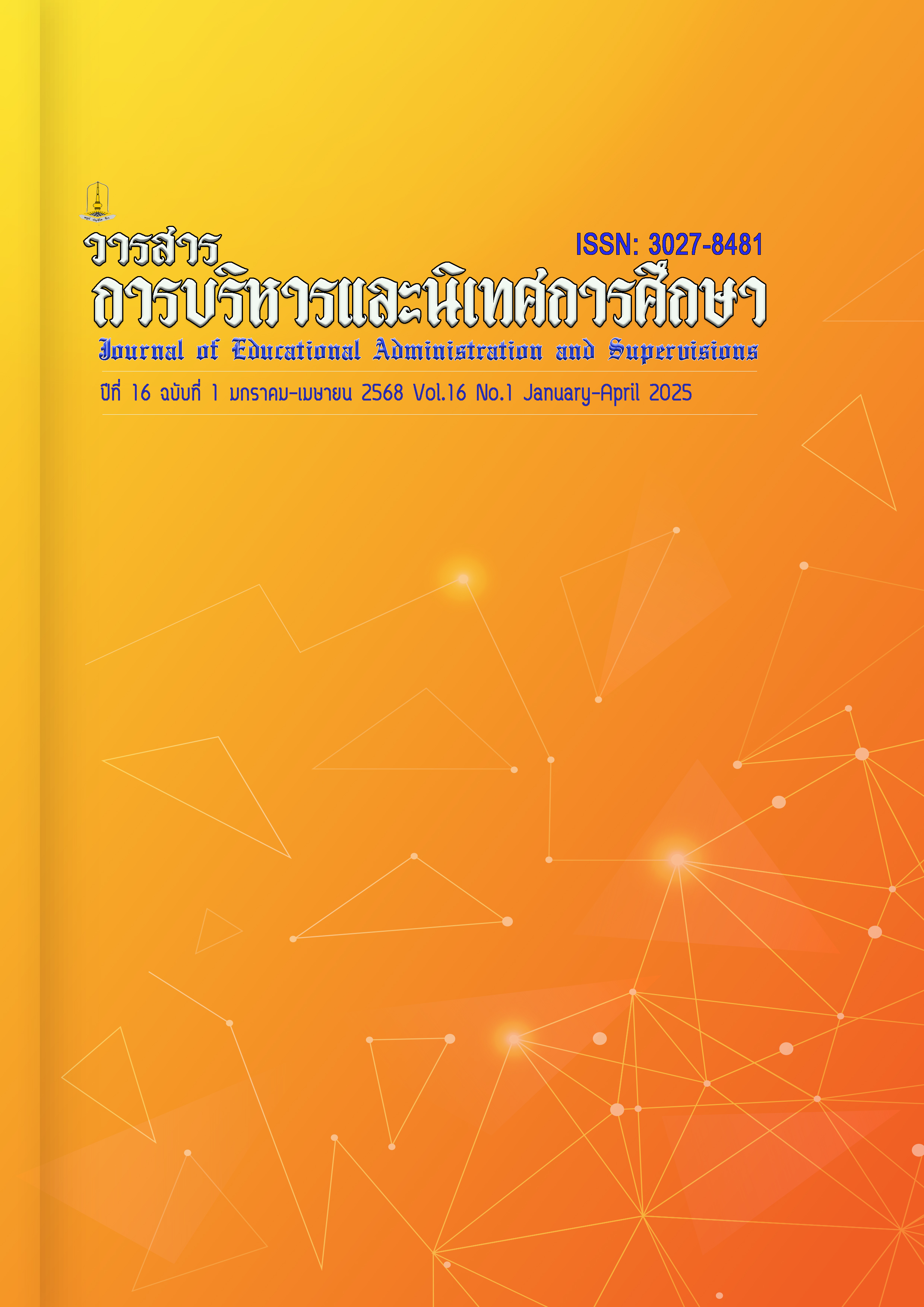Development of Program to Enhance Digital Leadership of School Administrators under the Surin Primary Educational Service Area Office 2
Main Article Content
Abstract
This research aimed to; 1) study current situation, desirable situation, and the essential needs to enhance digital leadership 2) develop the program to enhance digital leadership. Using a mixed-methods research approach, divided into 2 phases: Phase 1was the study of the current situation, desired situation, and essential needs. The samples were 323 school administrators and teachers selected through the stratified random sampling. The research instrument was scaling questionnaire. Using Index of Congruence, IOC ranged 1.00, The discrimination level ranging of the current condition from .350- .889 and the desired condition from .345- .946, finding Cronbach's Alpha Coefficient has a confidence value of the current condition is .964 and the desired condition is .952 and Phase 2 was program development to enhance digital leadership, study best practices of school administrators through interviews and then draft a program, and evaluate propriety and feasibility of the program by 5 experts. The data were analyzed by using mean, standard deviation and priority need index.
The results showed that;
1. The current situation was overall at the high level. The highest average aspect was digital communication. The desirable situation was overall at the highest level. The highest average aspect was digital culture. The needs assessment from more to less were digital culture, developing digital professionalism, digital vision, digital literacy, and digital communication.
2. The programs to enhance digital leadership of school administrators consist of 1) Principle 2) Objectives 3) Content consists of 5 modules: Module 1 was digital vision, Module 2 was digital literacy, Module 3 was digital communication, Module 4 was developing digital professionalism, and Module 5 was digital culture 4) Development method 5) Evaluation. The results of overall program evaluation were the highest level appropriate and the possibilities are at the highest level.
Downloads
Article Details

This work is licensed under a Creative Commons Attribution-NonCommercial-NoDerivatives 4.0 International License.
References
กัญญารัตน์ สุขแสน. (2563). รูปแบบการพัฒนาภาวะผู้นำด้านดิจิทัลของผู้บริหารโรงเรียนในเครือมูลนิธิคณะเซนต์คาเบรียลแห่งประเทศไทย [วิทยานิพนธ์ปริญญาดุษฎีบัณฑิต, มหาวิทยาลัยรังสิต]. https://so04.tci-thaijo.org/index.php/JSBA/article/download/248666/171654/903802
จิณณวัตร ปะโคทัง. (2561). ยุทธศาสตร์การบริหารจัดการเพื่อพัฒนาคุณภาพ (พิมพ์ครั้งที่ 6). โรงพิมพ์ศิริธรรมออฟเซ็ท.
จิรพล สังข์โพธิ์. (2560). ภาวะผู้นำในการบริหารยุคดิจิทัล: องค์การไอทีและองค์การที่เกี่ยวข้องกับไอทีในเขต กรุงเทพมหานครและปริมณฑล. วิทยาลัยนวัตกรรมมหาวิทยาลัยธรรมศาสตร์.
จิรวัฒณ์ รักปัญญาสุทธิกุล. (2564). แนวทางการพัฒนาภาวะผู้นำเชิงเทคโนโลยีของผู้บริหารสถานศึกษาสังกัดสำนักงานอาชีวศึกษาจังหวัดร้อยเอ็ด [วิทยานิพนธ์ปริญญามหาบัณฑิต, มหาวิทยาลัยราชภัฏมหาสารคาม]. https://so02.tci-thaijo.org/index.php/SNGSJ/article/view/251222/172635
ญดาภัค กัลปดี. (2559). การพัฒนาโปรแกรมเสริมสร้างภาวะผู้นำการเปลี่ยนแปลงเชิงสร้างสรรค์ของครูประถมศึกษา [วิทยานิพนธ์ปริญญาดุษฎีบัณฑิต ไม่ได้ตีพิมพ์]. มหาวิทยาลัยมหาสารคาม.
ดาวรุวรรณ ถวิลการ. (2564). ภาวะผู้นำดิจิทัล Digital Leadership. มหาวิทยาลัยขอนแก่น.
นิกร จันภิลม, ศตพล กัลยา, ภาสกร เรืองรอง และรุจโรจน์ แก้วอุไร . (2562). เทคโนโลยีการศึกษาในยุค Thailand 4.0. วารสารปัญญาภิวัฒน์, 11(1), 304-314, https://so05.tci-thaijo.org/index.php/pimjournal/article/view/186303
บริษัท ซีพี ออลล์ จํากัด (มหาชน). (2567). การพัฒนาผู้นำและทรัพยากรบุคคล. https://www.cpall.co.th/sustain/social-dimension/leadership-and-human-capital-development.
บุญชม ศรีสะอาด. (2560). การวิจัยเบื้องต้น ฉบับปรับปรุง (พิมพ์ครั้งที่ 10). สุรีวิยาสาส์น.
บุษยพรรณ สุระคาย. (2565). การพัฒนาโปรแกรมเสริมสร้างภาวะผู้นำดิจิทัลของผู้บริหารสถานศึกษา สังกัดสำนักงานเขตพื้นที่การศึกษามัธยมศึกษาบุรีรัมย์ [วิทยานิพนธ์ปริญญามหาบัณฑิต, มหาวิทยาลัยมหาสารคาม]. http://ojs.mbu.ac.th/index.php/jbpe/article/view/2117
พิชญ์พิมล สุนทะวงศ์. (2565). แนวทางการพัฒนาภาวะผู้นำเชิงดิจิทัลของครูสังกัดสำนักงานเขตพื้นที่การศึกษามัธยมศึกษามหาสารคาม [วิทยานิพนธ์ปริญญามหาบัณฑิต ไม่ได้ตีพิมพ์]. มหาวิทยาลัยมหาสารคาม.
ภิรมณ์ ซึมกระโทก. (2565). การพัฒนาโปรแกรมเสริมสร้างภาวะผู้นำดิจิทัลของผู้บริหารสถานศึกษา สังกัดสำนักงานเขตพื้นที่การศึกษาประถมศึกษามหาสารคาม เขต 1 [วิทยานิพนธ์ปริญญามหาบัณฑิต, มหาวิทยาลัยมหาสารคาม]. http://ojs.mbu.ac.th/index.php/jbpe/article/view/2132
วัชราภรณ์ แสงทิตย์. (2565). การพัฒนาโปรแกรมเสริมสร้างภาวะผู้นำดิจิทัลของครู สังกัดสำนักงานเขตพื้นที่การศึกษามัธยมศึกษานครราชสีมา [วิทยานิพนธ์ปริญญามหาบัณฑิต, มหาวิทยาลัยมหาสารคาม]. https://search.tci-thailand.org/article.html?b3BlbkFydGljbGUmaWQ9NzM1MDk2
ไวยวิทย์ มูลทรัพย์. (2565). การพัฒนาโปรแกรมเสริมสร้างภาวะผู้นำดิจิทัลของผู้บริหารสถานศึกษา สังกัดสำนักงานเขตพื้นที่การศึกษามัธยมศึกษากาฬสินธุ์ [วิทยานิพนธ์ปริญญามหาบัณฑิต ไม่ได้ตีพิมพ์]. มหาวิทยาลัยมหาสารคาม.
สุพัตรา สุวรรณชัยรบ. (2564). โปรแกรมเสริมสร้างทักษะภาวะผู้นำดิจิทัลของผู้บริหารสถานศึกษา สังกัดอาชีวศึกษาจังหวัดร้อยเอ็ด [วิทยานิพนธ์ปริญญามหาบัณฑิต, มหาวิทยาลัยมหาสารคาม]. https://so02.tci-thaijo.org/index.php/SNGSJ/article/view/250213
สำนักงานเขตพื้นที่การศึกษาประถมศึกษาสุรินทร์เขต 2. (2567). แผนปฏิบัติการประจำปีงบประมาณ พ.ศ. 2567. https://srn2.go.th/index/.
สำนักงานคณะกรรมการการศึกษาขั้นพื้นฐาน. (2563). นโยบายสำนักงานคณะกรรมการการศึกษาขั้นพื้นฐาน ปีงบประมาณ 2563. สำนักงานคณะกรรมการการศึกษาขั้นพื้นฐานกระทรวงศึกษาธิการ.
สำนักงานเลขาธิการสภาการศึกษา. (2562). รายงานการวิจัยเรื่องการวิจัยและพัฒนานโยบายการพัฒนาครูและบุคลากรทางการศึกษา. พริกหวาน กราฟฟิค.
สุชญา โกมลวานิช. (2563). องค์ประกอบของภาวะผู้นำดิจิทัลของผู้บริหารโรงเรียน สังกัดสำนักงานเขตพื้นที่การศึกษา มัธยมศึกษาเขต 23 [วิทยานิพนธ์ปริญญามหาบัณฑิต, มหาวิทยาลัยขอนแก่น]. https://app.gs.kku.ac.th/images/img/support/grc2020/pdfabstracts/HMO16.pdf
Krejcie, R. V. & Morgan, D. W. (1970). Determining sample size for research activities. Educational and Psychological Measurement, 30 (3), 607-610.


